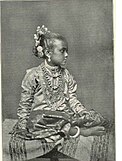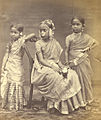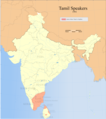Portal:Tamils
The Tamils portal
The Tamil people, also known as Tamilar (Tamil: தமிழர், romanized: Tamiḻar, pronounced [t̪amiɻaɾ] in the singular or தமிழர்கள், Tamiḻarkaḷ, [t̪amiɻaɾɡaɭ] in the plural), Tamilians, or simply Tamils (/ˈtæmɪlz, ˈtɑː-/ TAM-ilz, TAHM-), are a Dravidian ethnolinguistic group who natively speak the Tamil language and trace their ancestry mainly to India's southern state of Tamil Nadu, to the union territory of Puducherry, and to Sri Lanka. The Tamil language is one of the world's longest-surviving classical languages, with over 2000 years of Tamil literature, including the Sangam poems, which were composed between 300 BCE and 300 CE. People who speak Tamil as their mother tongue and are born in are considered Tamils.
Tamils constitute 5.9% of the population in India (concentrated mainly in Tamil Nadu and Puducherry), 15% in Sri Lanka (excluding Eelam Moors), 7% in Malaysia, and 5% in Singapore. From the 4th century BCE, urbanisation and mercantile activity along the western and eastern coasts of Tamilakam -- what is today Kerala and Tamil Nadu -- led to the development of four large Tamil empires, the Cheras, Cholas, Pandyas, Pallavas, and velirs and a number of smaller states, all of whom were warring amongst themselves for dominance. The Jaffna Kingdom, and vanni chieftaincies inhabited by Eelam Tamils, was once one of the strongest kingdoms of Sri Lanka and controlled much of the north of the island. (Full article...) Selected article -Cilappatikāram (Tamil: சிலப்பதிகாரம், Malayalam: ചിലപ്പതികാരം, IPA: ʧiləppət̪ikɑːrəm, lit. "the Tale of an Anklet"), also referred to as Silappathikaram or Silappatikaram, is the earliest Tamil epic. It is a poem of 5,730 lines in almost entirely akaval (aciriyam) meter. The epic is a tragic love story of an ordinary couple, Kannaki and her husband Kovalan. The Cilappatikaram has more ancient roots in the Tamil bardic tradition, as Kannaki and other characters of the story are mentioned or alluded to in the Sangam literature such as in the Naṟṟiṇai and later texts such as the Kovalam Katai. It is attributed to a prince-turned-monk Iḷaṅkō Aṭikaḷ, and was probably composed in the 5th or 6th century CE. The Cilappatikaram is set in a flourishing seaport city of the early Chola kingdom. Kannaki and Kovalan are a newly married couple, in love, and living in bliss. Over time, Kovalan meets Matavi (Madhavi) – a courtesan. He falls for her, leaves Kannaki and moves in with Matavi. He spends lavishly on her. Kannaki is heartbroken, but as the chaste woman, she waits despite her husband's unfaithfulness. During the festival for Indra, the rain god, there is a singing competition. Kovalan sings a poem about a woman who hurt her lover. Matavi then sings a song about a man who betrayed his lover. Each interprets the song as a message to the other. Kovalan feels Matavi is unfaithful to him and leaves her. Kannaki is still waiting for him. She takes him back. (Full article...)General imagesSelected biography -Valangaiman Sankaranarayana Srinivasa Sastri CH PC (22 September 1869 – 17 April 1946) was an Indian politician, administrator, educator, orator and Indian independence activist. He was acclaimed for his oratory and command over the English language. Srinivasa Sastri was born to a poor temple priest in the village of Valangaiman near Kumbakonam, India. He completed his education at Kumbakonam and worked as a school teacher and later, headmaster in Triplicane, Madras. He entered politics in 1905 when he joined the Servants of India Society. Sastri served as a member of the Indian National Congress from 1908 to 1922, but later resigned in protest against the non-cooperation movement. Sastri was one of the founding members of the Indian Liberal Party. In his later days, he was strongly opposed to the partition of India. Srinivasa Sastri served as a member of the Madras Legislative Council from 1913 to 1916, Imperial Legislative Council of India from 1916 to 1919 and the Council of State from 1920 to 1925. Sastri also functioned as India's delegate to the League of Nations, as member of the Privy Council of the United Kingdom and agent to the Union of South Africa. (Full article...)CategoriesTopicsTamil People Countrywide: India • Sri Lanka • Canada • Malaysia • Singapore • South Africa • England Related Ethnic Groups: Brahui • Gond • Kannadiga • Khonds • Kodava • Oraon • Malayali • Telugus • Tuluvas Related indigenous Groups: Badagas • Toda • Kuruba
See also: List of Tamil people, Tamil script, Tamil Script Code for Information Interchange Related portalsWikiProjectsThings to do
Associated WikimediaThe following Wikimedia Foundation sister projects provide more on this subject:
Discover Wikipedia using portals |































































